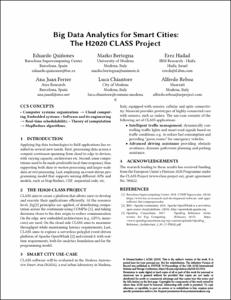Big Data Analytics for Smart Cities: The H2020 CLASS Project

Visualitza/Obre
Cita com:
hdl:2117/167233
Tipus de documentComunicació de congrés
Data publicació2018-06-04
EditorACM
Condicions d'accésAccés obert
Tots els drets reservats. Aquesta obra està protegida pels drets de propietat intel·lectual i
industrial corresponents. Sense perjudici de les exempcions legals existents, queda prohibida la seva
reproducció, distribució, comunicació pública o transformació sense l'autorització del titular dels drets
Abstract
Applying big-data technologies to field applications has resulted in several new needs. First, processing data across a
compute continuum spanning from cloud to edge to devices, with varying capacity, architecture etc. Second, some computations need to be made predictable (real-time response), thus supporting both data-in-motion processing and larger-scale data-at-rest processing. Last, employing an event-driven programming model that supports mixing different APIs and models, such as Map/Reduce, CEP, sequential code, etc.
CitacióQuiñones, E. [et al.]. Big Data Analytics for Smart Cities: The H2020 CLASS Project. A: "SYSTOR '18 Proceedings of the 11th ACM International Systems and Storage Conference". ACM, 2018, p. 130.
ISBN978-1-4503-5849-1
Versió de l'editorhttps://dl.acm.org/citation.cfm?id=3211914
Col·leccions
| Fitxers | Descripció | Mida | Format | Visualitza |
|---|---|---|---|---|
| big data analytics for smart cities.pdf | 350,2Kb | Visualitza/Obre |

